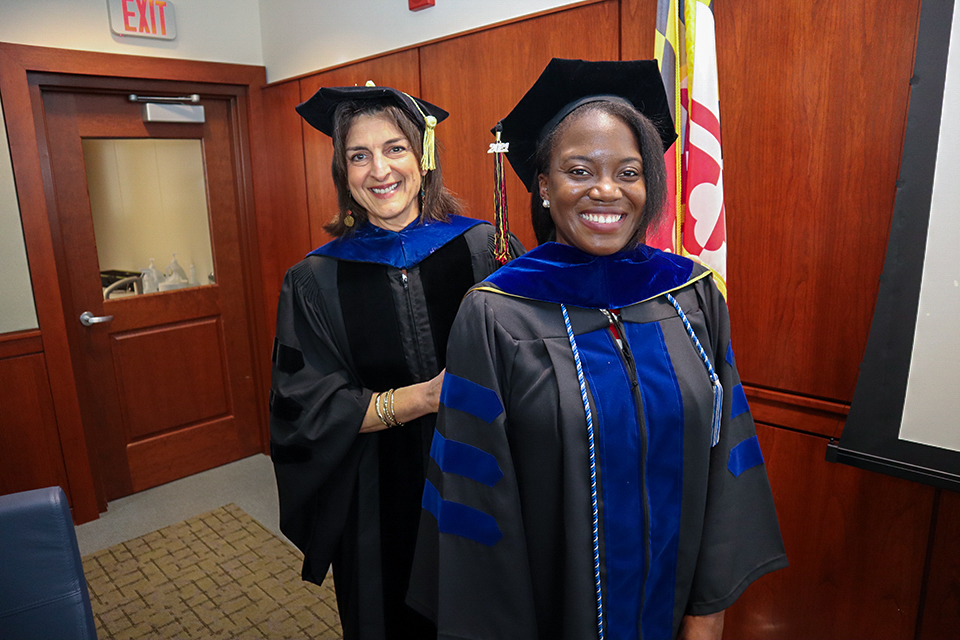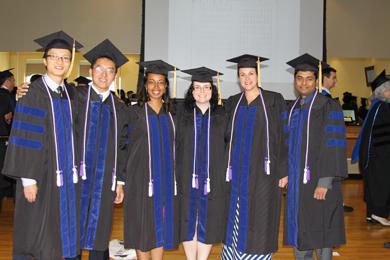First PSC Intern Completes Department’s Graduate Program
Student credits department’s summer internship program with opening her eyes to the field of pharmaceutical sciences.
By Malissa Carroll
May 20, 2013
The University of Maryland’s commencement ceremony on May 17 marked the culmination of Maura O’Neill’s experience as a student in the Pharmaceutical Sciences Graduate Program at the University of Maryland School of Pharmacy. Surrounded by her family and friends, O’Neill walked across the stage to receive her doctoral degree in pharmaceutical sciences; an experience that she has been looking forward to since she was an undergraduate at Notre Dame of Maryland University.
A chemistry and mathematics major, O’Neill candidly admits that she was unsure which path she wanted to pursue as an undergraduate student. Knowing that she had some research experience, her professors suggested she apply to a new summer internship program at the University of Maryland School of Pharmacy during the summer of her junior year. Although she did not realize it at the time, the decision to apply to that program would change her life.
“Before completing that internship, I had no idea that the School of Pharmacy offered graduate programs for students who were not interested in receiving the Doctor of Pharmacy degree,” says O’Neill. “However, through this program I was able to work with graduate students in the lab, where I learned about the interdisciplinary nature of the program. I saw that students had the opportunity to work in many different labs and learn a variety of techniques.”
O’Neill will be the first student to have completed the PSC summer internship program and successfully apply to and graduate from the PSC graduate program.
Launched in 2005, the PSC summer internship was initially a partnership between the University of Maryland School of Pharmacy and Notre Dame of Maryland University, though it has since expanded and now accepts applicants nationwide. O’Neill applied for the internship and was excited to have an opportunity to further expand her research skills. She was accepted and assigned to work in the lab of Andrew Coop, PhD, professor and chair of the department.
“Maura was a pioneering member of our very first internship program,” says Coop. “The qualities she showed and, importantly, feedback she provided about how to improve the program helped the department to expand the program nationwide and facilitate valuable experiences in the pharmaceutical sciences for a diverse range of undergraduates. Her vision and commitment to the success of the program is a major reason for its continued success.”
During her internship, O’Neill worked with Coop on a number of projects related to organic synthesis, including the design of new small molecules that could be used to develop new opioids to treat addiction disorders with fewer side effects than those drugs currently available on the market.
Following the completion of her 10-week internship, O’Neill’s interest in the PSC graduate program continued to grow. She decided to apply to the program following her graduation from Notre Dame. Her superior academic and research background ensured her acceptance. “Since being admitted to the program, I have had the opportunity to work with a lot of great professors and learn many techniques that I will be able to apply later in my career,” she says.
Though she enjoyed her work in Coop’s lab during the internship, O’Neill became interested in learning more about the heme uptake system in Pseudomonas aeruginosa (P. aeruginosa), a common hospital-acquired infection and leading cause of death for individuals with cystic fibrosis, after completing a rotation in the lab of Angela Wilks, PhD, professor and vice-chair of research in PSC.
“When Maura first joined my lab with a background in chemistry and little exposure to biological systems, I thought it might take her a little longer than other students to get up to speed,” says Wilks. “However, she very quickly mastered her coursework and research, all the while showing a natural ability for scientific research as reflected in the outstanding quality of her work.”
O’Neill has presented her work at a Gordon Research Conference in Ventura, Calif., and published her research in Proceedings of the National Academy of Sciences of the United States of America (PNAS), one of the world’s most-cited multidisciplinary scientific journals. In April 2013, she successfully defended her dissertation, which focused on the protein-protein interaction between Pseudomonas aeruginosa cytoplasmic protein (PhuS) and heme oxygenase, which breaks down heme to release iron for the bacteria.
“I know that she will move on to have a successful career with a strong foundation, leaving behind a mentor who is happy to call her a ‘friend and colleague,’” says Wilks.



